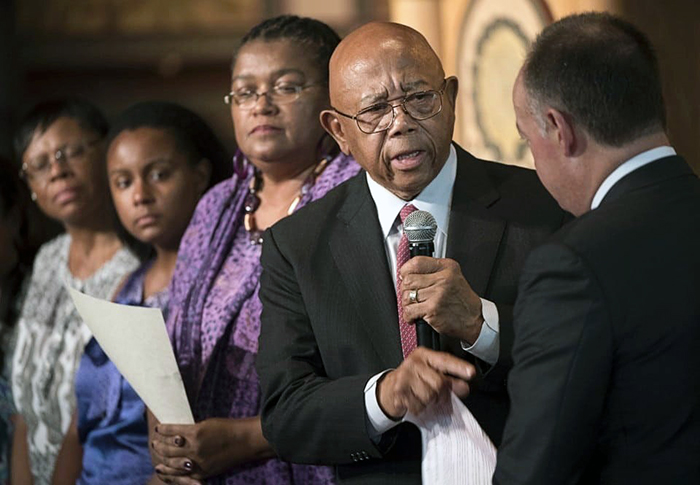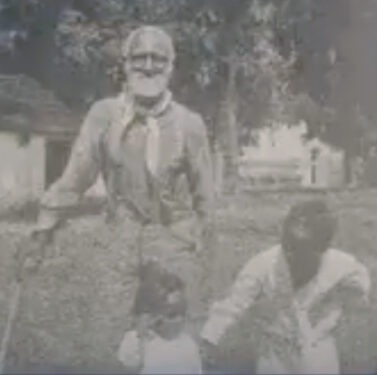
PROSPECT HEIGHTS — Last year, the Society of Jesus in the U.S. — the Jesuits — pledged to raise $100 million for reparations to descendants of enslaved plantation workers owned by the priests in the 1800s.
But so far, says an organization that represents the descendants, only $15 million of those funds have materialized, and they’re raising the question: What is taking so long?
The answer may be that some voices inside the Jesuit community are decidedly against paying reparations now for wrongs their ancestors may have committed.
The Jesuits started the campaign with a $15 million contribution to a trust that will feed a foundation to fund educational scholarships and grants, emergency needs of elderly descendants, and programs to foster racial healing. The ultimate goal is to raise $1 billion by 2029.
On Aug. 3, Joseph Stewart, president of the Descendants Truth and Reconciliation Foundation, wrote a letter to Father Arturo Sosa, the superior general of the Society of Jesus in Rome. In the missive, Stewart described encountering modern Jesuits who “maintain the position that they weren’t here during Jesuit enslavement, never enslaved anyone, and thus do not ‘owe’ anyone anything.”
In a Sept. 13 interview with The Tablet, Stewart said he complained to Father Sosa, hoping the top Jesuit would override these so-called “hardliners,” saying, “You have the power cut through all of this.”
He urged Father Sosa to direct Jesuit provincials in the U.S. to jumpstart donations significantly by the end of the year. To that end, he asked that the Jesuits deposit $57 million from the sale of plantation lands in 2009.
Stewart also suggested the Jesuits keep selling the remaining plantation property and deposit the money incrementally until the whole $100 million pledge is in hand by next July. He said the Jesuits could maintain this strategy until the ultimate $1 billion is reached by July 2029.
A ‘Sin Against God’
Stewart concluded his letter by asking Father Sosa to reply within 45 days. As of mid-September, he said, Father Sosa had not responded.
However, Jesuit provincials in the U.S. issued a public statement on Aug. 15 to “recognize and share” in Stewart’s concerns about “the pace of our fundraising efforts.”
“With a campaign goal of $100 million, we are continuing to work with our network partners to secure resources toward that end,” the statement added.
Stewart noted that back in 2017, Father Sosa wrote him a letter saying that Jesuit slaveholding in the U.S. was “a sin against God and a betrayal of the human dignity of your ancestors.”
But in the same letter, the superior general stated, “The Jesuit way of proceeding is for the Jesuit provincials in the United States, through the structure of the Jesuit Conference of Canada and the U.S.A., to continue to address this history. I do have confidence in the provincials.”

Fifth Generation
Stewart, who is about to turn 80, grew up on a small farm near Maringouin, in southern Louisiana. He recalled that while growing up, he did not know much about the ancestors who came before his great-grandmother. Back then, it was a good guess they probably were enslaved people, and Catholic, just like his family.
But Stewart said he was shocked to learn six years ago that he is a five-generation grandson of Isaac Hawkins — the first name on the bill of sale of enslaved people sold by the Jesuits in Maryland during the late 1830s.
Hawkins was about 70 years old when he was sold as “chattel” by the priests to two Louisiana plantation owners, Stewart said.
The Jesuits participation in slavery was first revealed in the 1990s by a few descendants researching their family histories. Historians delved deeper and learned how tobacco plantations in Maryland helped finance Jesuit missions and other institutions.
The Georgetown Memory Project, founded by Richard Cellini, a Harvard history professor, set out to learn the identities of the ancestors, now called the “GU272.” Cellini, also a lawyer and a Georgetown alum, reached Stewart to tell him he was a descendant of Hawkins.
Brooklyn native Dr. Craig Steven Wilder, a history professor at the Massachusetts Institute of Technology, explored the connections between higher education and slavery in his 2013 book, “Ebony and Ivy: Race, Slavery, and the Troubled History of America’s Universities.” In recent interviews with The Tablet, he explained how Jesuits became slave owners.
Make No Mistake
But the limited Church membership in Maryland generated scant tithing, so tobacco plantations became an important revenue stream to support Jesuit missions and institutions they supported. Among them was Georgetown University, which did not charge tuition in its early days.
Consequently, as Georgetown struggled, Jesuit leaders decided in 1838 to sell 272 enslaved people, including Isaac Hawkins, his son, and other family members, Stewart said.
The GU272 sale, according to Wilder, also helped fund Catholic expansionism in Missouri, Kentucky, and New York.
“You can’t help but feel a sense of betrayal,” Stewart said. “Because, make no mistake, it was the Jesuit enslavement of my ancestors that helped expand the Catholic Church throughout the United States.”
Reconciliation, not Reparations
Stewart said his organization chose to take the descendants’ collective anger and funnel it into positive action. It does not pursue lawsuits or reparations of cash payments to descendants, now estimated to be about 5,000 people, Stewart said.
Instead, the money raised by the Jesuits is intended to fund reconciliation efforts for many people.
Stewart stressed that the foundation is not composed of descendants only but also the Jesuits themselves, who agreed to partner with descendants to form the Descendants Truth and Reconciliation Foundation.
This partnership is intended to address the sin of slavery and achieve reconciliation, he said.
Scholarships are an important part of that because quality education is a proven way to change the economic trajectories of entire generations, Stewart said.
“This isn’t about Joe Stewart,” he said. “This is about thousands of people who are current-day descendants of Jesuit enslavement. And, more importantly, it’s about all of those descendants of Jesuit enslavement for generations to come.”
He also stressed the so-called “hardliners” do not represent all Jesuits, noting there are a few priests who are “all in” on the foundation’s vision — “morally, intellectually, and spiritually.” It shouldn’t matter that hardliners exist, he added, because the Jesuits, as an organization, signed on to the foundation’s vision when they agreed to help create it.
“Let’s stop the procrastination,” Stewart said during the Sept. 13 interview. “The Church is supposed to be the moral leader, helping God’s children reach a different place. “So the vision is still good. You already agreed to it. Let’s make it happen.”
The Provisionals in the U.S., in their Aug. 15 statement, said they are “dedicated to the long-term vision to which we agreed with Descendant leaders, and we believe that our efforts will bear fruit.”

